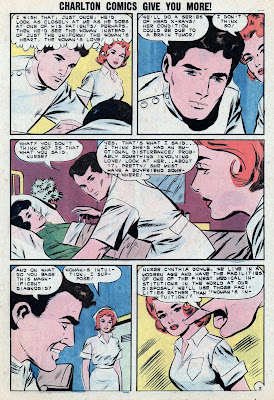One of the most interesting things, to me, about hospital romance comics, is that in the 'dance' of the nurse and the doctor, we see enshrined the male-female hierarchy that has underpinned our society for centuries. Medicine is male, scientific, rational, and has assumed authority over female nursing, with the latter's attention to the personal, its emphasis in caring exploited as a weakness in this battle of the sexes. Consequently, the nursing profession's focus, in its quest to achieve enhanced status, has in many ways been one that has attempted to accentuate the 'masculine' - the scientific basis for nursing - and de-emphasize the femininity that belongs to the traditional image of nurses. That femininity equates, in a patriarchal society, with submission and subordination to the male. So long gone are the distinctive nurse uniforms that adorn the characters in romance comics, and instead in real life we have unisex, mostly loose fitting scrubs that lessen the distinction between the various medical professionals and between male and female. This is very much the end product of second wave feminism, but as with many reflections on what has become as a result of that chapter of social evolution, sometimes we're left wondering if something valuable might have been lost along the way.
Cynthia Doyle Nurse in Love is one of that group of Charlton hospital or medical romance books published from the early- through mid-1960s that rode the wave of enthusiasm for television dramas of the same genre and same time period - Ben Casey, Dr. Kildare, The Nurses (all adapted for comic books by Dell), and no doubt others that I'm unaware of. As you've seen from some of my other posts, nurses were a common feature in romance comics throughout their history, but for a few brief years hospital romances emerged as a sub-genre all of their own. The nurse-doctor relationship that was the basis for these romances was as dependent upon the traditional male-females roles as the whole romance genre itself, and in many ways was a distilled version of it. So it seems as feminism began to influence society and change the way that relationship was seen, the hospital romance went by the wayside along with romance comics generally as both failed to adapt.
What makes these hospital or medical romance books unusual is that they are series featuring the same characters, unlike most romance books in which the stories are usually one offs. Charlton, Dell, DC, and Marvel all had medical romance series of various descriptions, although Charlton and Dell were certainly the leaders in this field. Outside of medical series, I can think of the random appearances of Jonnie Love in Charlton books, and various DC running features, like Bonnie Tyler the airline hostess in Young Romance, The Life and Loves of Lisa St. Claire in Young Love, and so on. As is the case in other circumstances, Charlton seems to have been the innovator, at least a pioneer, both of the ongoing series in a romance book as well as the medical romance sub-genre. Nurse Betsy Crane begins August 1961, with Marvel's Linda Carter Student Nurse in September '61 and Dell's Linda Lark, Student Nurse in October of the same year. DC's Mary Robin R.N. didn't begin until the September 1963 issue of Young Love.
So this is something of a stereotyped male-female interaction but one which has perhaps a strong basis in reality. The woman has to play the game of allowing the male ego to maintain its illusion of superiority. At the same time, because something important is at stake, she has to figure out a way to get the necessary done while going around the obstacle erected by the male's obstinacy.
Calculated submission was the way first wave feminism attained limited autonomy for middle class women, within a restricted professional realm led by nursing and social work. The early 1960s is near to the end of that phase, the closing of a chapter that began with Florence Nightingale and ended with Night Nurse! This story was "The Case of the Teenage Mother" from the Feb 1963 issue of Charlton's Cynthia Doyle Nurse in Love (issue #68).












Phenomenal essay deconstructing medical romance comic books!
ReplyDeleteI love this cover! I love the way it doesn't play around, just slaps the big redhead front and center. Really nice.
ReplyDeleteThe comic was really cool. I particularly loved the differing diagnosis. Doc says brain tumor - nurse says a wounded heart - a rather brilliant shorthand version of the male and female. In real life, of course, the nurse's career would have been over. To refuse a doctor's instruction regarding a patient because of womanly intuition? Yipes!
I really enjoyed you analysis of the women's lib movement and the progressive role Charlton played. Nicely observed. – Mykal
Thanks for commenting. I've been out of the country, with no internet, recently, and then super busy as soon as we got back - conference tomorrow and I'm presenting on Racial Integration in War Comics, so all that assistance I've received from you guys has helped me prepare. Better get some sleep now though!
ReplyDeleteFascinating!
ReplyDelete